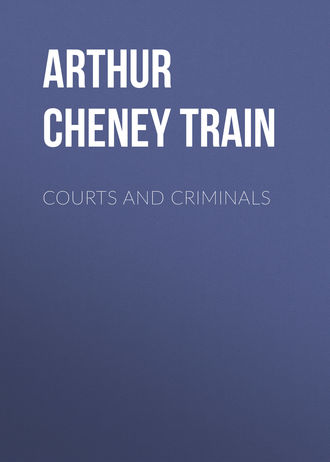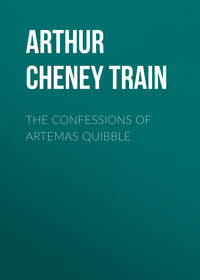
Courts and Criminals
Of course, if the insanity under which the defendant labors bears no relation to or connection with the deed for which he is on trial, there would logically be no reason why his insanity on other subjects should be any defence to his crime. For example, there is the well-known case of the Harvard professor who was apparently sane on all other matters, yet believed himself to be possessed of glass legs. Had this man in wanton anger struck and killed another, his "glass leg" delusion could not logically have availed him. If, however, he had struck and killed one who he believed was going to shatter his legs it might have been important. The illustration is clear enough, but its application probably involves a mistaken premise. If he thought he had glass legs his mind was undoubtedly deranged—whether enough or not enough to constitute him irresponsible or beyond the effect of penal discipline might be a difficult question. The generally accepted doctrine is, that if a man has a delusion concerning something, which if actually existing as he believed it to be would be no excuse for his committing the criminal act, he is responsible and liable to punishment; but, as Bishop well says:
"This branch of the doctrine should be cautiously received; for delusion of any kind is strongly indicative of a generally diseased mind."
The new test to determine responsibility will recognize, as does the law of Germany, that there can be no criminal act where the free determination of the will is excluded by disease, and that the capacity to distinguish between right and wrong is inconclusive. It may perhaps have to take a general form, leaving it to a lay, or a mixed lay-and-expert jury to say merely whether the accused had a disease of the mind of a type recognized by science, and whether the alleged criminal act was of such a character as would naturally flow from that type of insanity, in which case it would seem obviously just to regard the defendant as partially irresponsible, and perhaps entirely so. Possibly the practical needs of the moment might be met by permitting such a jury to determine whether the defendant had such a knowledge of the wrongful nature and consequences of his act and such a control over his will as to be a proper subject of punishment.14 This would require the jury to find that the defendant had some knowledge of right and wrong and the power to choose between them. In any event, to render the accused entirely irresponsible, his act should arise out of and be caused solely by the diseased condition of his mind. The law, while asserting the responsibility of many insane people, should recognize "partial" responsibility as well.
The reader may feel that little after all would be gained, but he will observe that at any rate such a test, however imperfect, would permit juries to do lawfully that which they now do by violating their oaths. The writer believes that the best concrete test yet formulated and applied by any court is that laid down in Parsons vs. The State of Alabama (81 Ala., 577):
"1. Was the defendant at the time of the commission of the alleged crime, as matter of fact, afflicted with a disease of the mind, so as to be either idiotic, or otherwise insane?
"2. If such be the case, did he know right from wrong as applied to the particular act in question? If he did not have such knowledge, he is not legally responsible.
"3. If he did have such knowledge, he may nevertheless not be legally responsible if the two following conditions concur:
"(1) If, by reason of the duress of such mental disease, he had so far lost the power to choose between the right and wrong, and to avoid doing the act in question, as that his free agency was at the time destroyed.
"(2) And if, at the same time, the alleged crime was so connected with such mental disease, in the relation of cause and effect, as to have been the product of it solely."
But whatever modification in the present test of criminal responsibility is adopted, there must come an equally, if not even more important, reform in the procedure in insanity cases, which to-day is as cumbersome and out of date as the law itself. As things stand now in New York and most other jurisdictions there are no adequate means open to the State to find out the actual present or past mental condition of the defendant until the trial itself, and ofttimes not even then.
In New York, in cases like Thaw's, the accused, while fully intending to interpose the defence of insanity (which he is now permitted to do simply under the general plea of "not guilty") may not only conceal the fact until the trial, but may likewise successfully block every effort of the authorities to examine him and find out his present mental condition. He may thus keep it out of the power of the District Attorney to secure the facts upon which to move for a commission to determine whether or not he ought to be in an insane asylum or is a fit subject for trial, and at the same time prevent the prosecutor from obtaining any evidence through direct medical observation by which to meet the claim, which may be "sprung" suddenly upon him later at the trial, that the defendant was irresponsible.
In order that this may be clearly understood by the reader he should fully appreciate the distinction between (1) the claim on the part of an accused that he is at present insane, and for that reason should not be either tried or punished for his alleged offence, and (2) the defence that he was (irrespective of his present mental condition) insane within the legal definition of irresponsibility at the time he committed it. No person who is incapable of understanding the nature of the proceedings against him or of consulting with counsel and preparing his defence can be placed on trial at all, or, if already on trial, can continue to be tried, and if a defendant "appears to the court to be insane," the judge may appoint a commission to examine him and report as to his present condition. This may be done upon the application either of the State of the accused through his counsel.
It was such a commission to determine the accused's present mental condition that District Attorney Jerome, upon the basis of the evidence introduced by the defence, applied for and secured during the first trial of Harry K. Thaw. The commission reported that Thaw was sane enough to be tried and the court then proceeded with the original case for the purpose of allowing the jury to say whether he knew the nature and quality of his act and that it was wrong when he shot and killed White.
This was a totally distinct proceeding from the interposition of the DEFENCE that the accused was irresponsible when he committed the crime charged against him and was not inconsistent with it.
Now supposing that the Commission had reported that Thaw was insane at the time of examination and not a fit subject for trial, but, on the contrary, ought to be confined in an insane asylum, the District Attorney would have spent some twenty odd thousand dollars and a year's time of one or more of his assistants in fruitless preparation. Yet, as the law stands on the books to-day in New York, there is no adequate way for the prosecution to find out whether this enormous expenditure of time or money is necessary or not, for it cannot compel the defendant to submit either to a physical or mental examination. To do so has been held to be a violation of his constitutional rights and equivalent to compelling him to give evidence against himself.
Thus when Thaw came to the bar at his first trial the State had never had any opportunity, through an examination by its physicians, to learn what his present condition was or past mental condition had been. The accused, on the other hand, had had over six months to prepare his defence and had fully availed himself of the time to submit to the most exhaustive examinations on the part of his own experts. The defendant's physicians came to court brimming with facts to which they could testify; while the State's experts had only the barren opportunity for determining the defendant's condition afforded by observing him daily in the court room and hearing what Thaw's own doctors claimed that they had discovered. There was no chance to rebut anything which the latter alleged that they had observed, and their testimony, save in so far as it was inconsistent or contradictory in itself, remained irrefutable.
There is probably no procedure which would be held constitutional whereby a compulsory examination of the accused could be had upon the mere application of the prosecuting authorities; but as a commission may generally be appointed at any time after an accused has been indicted if he "appears" to the court to be "insane," and as it is usually within the power of the District Attorney where such is the case to bring sufficient evidence of it to the attention of the court before the prisoner is brought to trial, little time is actually lost and justice is rarely defeated except in those cases (such as Thaw's) where an attempt is to be made to prove the accused insane at the time of the alleged crime although sane at the time of trial. Even here it would be the simplest thing in the world to remedy the difficulty and the proper legal steps in all jurisdictions should be taken immediately.
The two chief objects of such reforms should be, first, to relieve the ordinary jury in as many cases as possible from the necessity of passing upon the delicate issue of a defendant's mental condition at a previous time, and second, where this may not be avoided, to make their task as easy as possible by providing (a) a more scientific and definite test of legal responsibility and (b) an opportunity for adequate examination of defendants availing themselves of this defence.
This last and most practical reform can be easily secured by a slight alteration in the New York Code of Criminal Procedure, which already provides both for the entering of the specific plea of insanity and for the introduction of the defence and the proof of insanity under the general plea of "not guilty." At present the defendant has his choice of openly announcing or of concealing until the trial his intention of claiming that he was insane and so irresponsible for his crime. This is an advantage the results of which were probably not fully contemplated by the Legislature, and one to which an accused has no fair claim.
Fortunately, in the same section of the Code (658), which provides that the court may appoint a Commission to inquire into the sanity of a defendant at the time of his trial, there exists another provision, hitherto little noticed, that:
"When a defendant PLEADS INSANITY, as prescribed in Section 336, the court in which the indictment is pending, instead of proceeding with the trial of the indictment, may appoint a commission of not more than three disinterested persons to examine him and report to the court as to his insanity at the time of the commission of the crime."
If a defendant intends to prove himself irresponsible for his offence, why should he not be compelled to enter a specific plea to that effect? Once he has entered that plea, the law as it stands just quoted will do the rest. No reason has been brought to the attention of the writer why the admission of any evidence upon the defendant's trial tending to show that he was mentally irresponsible at the time of committing the crime should not be made contingent upon the defence of insanity having been specifically pleaded either at the time of his arraignment or later by substitution for or in conjunction with the plea of "not guilty." This would deprive him of no constitutional right whatever. There is no legal necessity of permitting an accused to prove insanity under a general answer of "not guilty." Then upon his own plea that he had been insane he could instantly be committed to some place of observation where a permanent medical board of inquiry could be given full opportunity to examine him and study his case with a view to determining his present and past mental condition. He would still have in prospect his regular jury trial, but if this board found him at the present time insane, the court could immediately commit him to an asylum pending recovery, precisely as under the present procedure, while if they found him sane at the present time, but reported that, in their opinion (whatever test, "medical" or "legal," they might have applied), he was irresponsible at the time he committed the crime, it is unlikely that any prosecutor would bring him to trial. If, however, they reported that he was not only sane, but had been sane at the time of his crime, it is probable that any proposed defence of insanity would be abandoned, while if it was still urged by the accused, the opinion of such a board would carry far greater weight at the ultimate trial of the case than the individual opinions of experts retained and paid by either side for that particular occasion only, and having had only a comparatively limited opportunity for examination. At any rate, if the court called in the services of such a board of medical judges to assist as amici curie in determining the defendant's condition, while their opinion would not be conclusive upon the jury, it would at least do away with the present lamentable necessity of learned men answering "yes" or "no" to a hypothetical question fifty thousand words long, when the most superficial personal examination of the accused would settle the matter definitely in their minds. Such a procedure is in general use in Germany and other continental countries, and is likewise substantially followed in Massachusetts, Maine, Vermont, and New Hampshire.15
There is good reason to hope that we may soon see in all the states adequate provision for preliminary examination upon the plea of insanity, and a new test of criminal responsibility consistent with humanity and modern medical knowledge. Even then, although murderers who indulge in popular crime will probably be acquitted on the ground of insanity, we shall at least be spared the melancholy spectacle of juries arbitrarily committing feeble-minded persons charged with homicide to imprisonment at hard labor for life, and in a large measure do away with the present unedifying exhibition of two groups of hostile experts, each interpreting an archaic and inadequate test of criminal responsibility in his own particular way, and each conscientiously able to reach a diametrically opposite conclusion upon precisely the same facts.
CHAPTER XI. The Mala Vita in America
There are a million and a half of Italians in the United States, of whom nearly six hundred thousand reside in New York City—more than in Rome itself. Naples alone of all the cities of Italy has so large an Italian population; while Boston has one hundred thousand, Philadelphia one hundred thousand, San Francisco seventy thousand, New Orleans seventy thousand, Chicago sixty thousand, Denver twenty-five thousand, Pittsburg twenty-five thousand, Baltimore twenty thousand, and there are extensive colonies, often numbering as many as ten thousand, in several other cities.
So vast a foreign-born population is bound to contain elements of both strength and weakness. The north Italians are molto simpatici to the American character, and many of their national traits are singularly like our own, for they are honest, thrifty, industrious, law-abiding and good-natured. The Italians from the extreme south of the peninsula have fewer of these qualities, and are apt to be ignorant, lazy, destitute, and superstitious. A considerable percentage, especially of those from the cities, are criminal. Even for a long time after landing in America, the Calabrians and Sicilians often exhibit a lack of enlightenment more characteristic of the Middle Ages than of the twentieth century.
At home they have lived in a tumble-down stone hut about fifteen feet square, half open to the sky (its only saving quality); in one corner the entire family sleeping in a promiscuous pile on a bed of leaves; in another a domestic zoo consisting of half a dozen hens, a cock, a goat, and a donkey. They neither read, think, nor exchange ideas. The sight of a uniform means to them either a tax-gatherer, a compulsory enlistment in the army, or an arrest, and at its appearance the man will run and the wife and children turn into stone. They are stubborn and distrustful. They are the same as they were a thousand or more years gone by.
When the writer was acting as an assistant prosecutor in New York County, a young Italian, barely twenty years of age, was brought to the bar charged with assault with intent to kill. The complainant was a withered Sicilian woman who claimed to be his wife. Both spoke an almost unintelligible dialect. The case on its face was simple enough. An officer testified that on a Sunday morning in Mulberry Bend Park, at a distance of about fifty feet from where he was standing, he saw the defendant, who had been walking peaceably with the complaining witness, suddenly draw a long and deadly looking knife and proceed to slash her about the head and arms. It had taken the officer but a moment or two to seize the defendant from behind and disarm him, but in the meantime he had inflicted some eleven wounds upon her body. No explanation had been offered for this terrible assault, and the complainant had appeared involuntarily before the Grand jury and afterward had to be kept in the House of Detention as a hostile witness. The woman, who appeared to be about fifty years old, was sworn, and on being questioned stated that she had been married to the defendant in Sicily three years before. She declined to admit that he had attacked or harmed her in any way, constantly mumbling: "He is my husband. Do not punish him!"
The defendant, however, seemed eager to get on the stand and to tell his story; nor did the introduction of the knife in evidence or the exhibition of the woman's wounds embarrass him in the slightest degree. His manner was that of a man who had only to explain to be entirely exonerated from blame. He nodded at the jury and the judge, and scowled at the complainant, who was speedily conducted to a place where no harm could possibly come to her. When at last he was sworn, he could hardly restrain himself into coherency.
"Yes—that woman forced me to marry her!" he testified in substance. "But in the eyes of God I am not her husband, for she bewitched me! Else would I have married an old crone who could not have borne me children? When her spells weakened I left her and came to America. Here I met the woman I love,—Rosina,—and as I had been bewitched into the other marriage, we lived together as man and wife for two years. Then one day a friend told me that the old woman had followed me over the sea and was going to throw her spells upon me again. But I did not inform Rosina of these things. The next evening she told me that an old woman had been to the house and asked for me. For days my first wife lurked in the neighborhood, beseeching me to come back to her. But I told her that in the eyes of God she was not my wife. Then, in revenge, she cast the evil eye upon the child—sul bambino—and for six weeks it ailed and then died. Again the witch asked me to go with her, and again I refused. This time she cast her evil eye upon my wife—and Rosina grew pale and sick and took to her bed. There was only one thing to do, you understand. I resolved to slay her, just as you—giudici—would have done. I bought a carving-knife and sharpened it, and asked her to walk with me to the park, and I would have killed her had not the police prevented me. Wherefore, O giudici! I pray you to recall her and permit me to kill her or to decree that she be hung!"
This case illustrates the depths of ignorance and superstition that are occasionally to be found among Italian peasant immigrants. Another actual experience may demonstrate the mediaeval treachery of which the Sicilian Mafiuso is capable, and how little his manners or ideals have progressed in the last five hundred years or so.
A photographer and his wife, both from Palermo, came to New York and rented a comfortable home with which was connected a "studio." In the course of time a young man—a Mafiuso from Palermo—was engaged as an assistant, and promptly fell in love with the photographer's wife. She was tired of her husband, and together they plotted the latter's murder. After various plans had been considered and rejected, they determined on poison, and the assistant procured enough cyanide of mercury to kill a hundred photographers, and turned it over to his mistress to administer to the victim in his "Marsala." But at the last moment her hand lost its courage and she weakly sewed the poison up for future use inside the ticking of the feather bolster on the marital bed.
This was not at all to the liking of her lover, who thereupon took matters into his own hands, by hiring another Mafiuso to remove the photographer with a knife-thrust through the heart. In order that the assassin might have a favorable opportunity to effect his object, the assistant, who posed as a devoted friend of his employer, invited the couple to a Christmas festival at his own apartment. Here they all spent an animated and friendly evening together, drinking toasts and singing Christmas carols, and toward midnight the party broke up with mutual protestations of regard. If the writer remembers accurately, the evidence was that the two men embraced and kissed each other. After a series of farewells the photographer started home. It was a clear moonlight night with the streets covered with a glistening fall of snow. The wife, singing a song, walked arm in arm with her husband until they came to a corner where a jutting wall cast a deep shadow across the sidewalk. At this point she stepped a little ahead of him, and at the same moment the hired assassin slipped up behind the victim and drove his knife into his back. The wife shrieked. The husband staggered and fell, and the "bravo" fled.
The police arrived, and so did an ambulance, which removed the hysterical wife and the transfixed victim to a hospital. Luckily the ambulance surgeon did not remove the knife, and his failure to do so saved the life of the photographer, who in consequence practically lost no blood and whose cortex was skilfully hooked up by a dextrous surgeon. In a month he was out. In another the police had caught the would-be murderer and he was soon convicted and sentenced to State prison, under a contract with the assistant to be paid two hundred and fifty dollars for each year he had to serve. Evidently the lover and his mistress concluded that the photographer bore a charmed life, for they made no further homicidal attempts.
So much for the story as an illustration of the mediaeval character of some of our Sicilian immigrants. For the satisfaction of the reader's taste for the romantic and picturesque it should be added, however, that the matter did not end here. The convict, having served several years, found that the photographer's assistant was not keeping his part of the contract, as a result of which the assassin's wife and children were suffering for lack of food and clothing. He made repeated but fruitless attempts to compel the party of the first part to pay up, and finally, in despair, wrote to the District Attorney of New York County that he could, if he would, a tale unfold that would harrow up almost anybody's soul. Mr. Jerome therefore, on the gamble of getting something worth while, sent Detective Russo to Auburn to interview the prisoner. That is how the whole story came to be known. The case was put in the writer's hands, and an indictment for the very unusual crime of attempted murder (there are only one or two such cases on record in New York State) was speedily found against the photographer's assistant. At the trial the lover saw his mistress compelled to turn State's evidence against him to save herself. She testified to the Christmas carols and the cyanide of mercury.
"Did you ever remove this terrible poison from the bolster?" demanded the defendant's counsel in a sneering tone.
"No," answered the woman.
"Have you ever changed the bolster?" he persisted.
"No."
"Then it's there yet?"
"I-I think so," falteringly.
"I demand that this incredible yarn be investigated!" cried the lawyer. "I ask that the court send for the bolster and cut it open here in the presence of the jury."
The writer had no choice but to accede to this request, and the bolster was hunted down and brought into court. With some anxiety both sides watched while the lining was slit with a penknife. A few feathers fluttered to the floor as the fingers of the witness felt inside and came in contact with the poison. The assistant was convicted of attempted murder on the convict's testimony, and sentenced to Sing Sing for twenty-five years. That was the end of the second lesson.





